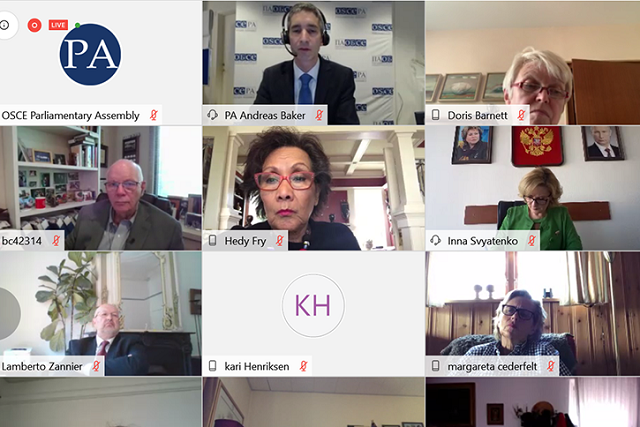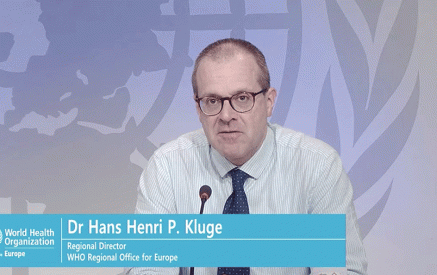COPENHAGEN, 22 June 2020 – Noting that racism and discrimination against ethnic, linguistic and religious minorities have been on the rise during the COVID-19 crisis, participants at an OSCE Parliamentary Assembly webinar said today that public officials have a duty to speak out against intolerance and to work in favour of social cohesion. The pandemic and related measures, if not carefully managed, have the potential to fuel discrimination, threaten stability and undermine security, they emphasized.
The webinar, entitled “COVID-19 response in diverse societies: challenges and opportunities for stability and social cohesion,” featured remarks from Chair of the OSCE PA Committee on Democracy, Human Rights and Humanitarian Questions Kyriakos Hadjiyianni (Cyprus); OSCE High Commissioner on National Minorities Ambassador Lamberto Zannier; and Nada Al-Nashif, Deputy UN High Commissioner for Human Rights.
Opening the event, Hadjiyianni noted that some studies indicate that online traffic to hate websites has increased during the COVID-19 pandemic by as much as 200 per cent in some countries and that spikes in hate-based incidents have been widely reported.
“We should all recognize that at a time of such stress as this pandemic is causing, we must continue to be sensitive about how we express our thoughts and concerns,” Hadjiyianni said. “Such comments can quickly be turned into scapegoating of minorities and feed intolerance and long-existing discrimination.” He cited the OSCE PA’s Luxembourg Declaration, which called for creating a “coalition of respect by publicly speaking out against hate speech and other manifestations of intolerance.”
Read also
Zannier stressed the importance of trying to protect those who are more vulnerable because of the pandemic. He highlighted a set of recommendations by the OSCE HCNM on ensuring that COVID-19 emergency measures promote social cohesion.
Responses to COVID-19 should be inclusive and sensitive to societal diversity, he said, noting that it is important for governments to prioritize protecting the economically vulnerable, maintaining zero tolerance for discrimination and xenophobia, providing public services and communications in minority languages, and upholding human rights. Areas that must be monitored, Zannier said, include discrimination and hate speech.
Al-Nashif spoke about an ‘infodemic’ related to COVID-19, with a disturbing proliferation of fake news and conspiracy theories. Making verified and credible information available to all and especially in local and minority languages has been an ongoing issue in the context of the pandemic, she said.
Highlighting positive action by governments in addressing hate speech, Al-Nashif stressed that this issue requires constant vigilance. New divisions have been created and existing ones have been accentuated, she noted, saying that the pandemic has exacerbated inequalities that were already in place. She highlighted the Black Lives Matter protests as a reminder of the need to tackle racial discrimination, pointing to an urgent session of the UN’s Human Rights Council on this topic that took place last week.
OSCE PA President George Tsereteli (Georgia) also spoke at the webinar, welcoming the commitment of parliamentarians to address these difficult issues head-on. “This is a time when such leadership has an increased potential to have real and lasting change for our societies,” he said.
In the discussion, parliamentarians explored the challenges and opportunities in diverse societies presented by COVID-19, and highlighted ways to help support social cohesion in responses to the pandemic. Participants stressed the importance of collecting disaggregated data to help ensure fact-based decision-making, and discussed the heightened health risks to minority communities and the possible impact on elections. OSCE parliamentarians stressed measures that have been taken in their countries to counteract scapegoating of minorities as well as efforts to close the digital divide to ensure that minority communities have access to information.
OSCE PA Vice-President and Rapporteur of the human rights committee Kari Henriksen (Norway) highlighted the efforts of people around the world banding together to demand equality and respect for all in the context of the Black Lives Matter movement. “This grassroots movement and wave of protests highlight the terrible consequences of intolerance and discrimination, and how much these issues can impact social cohesion and stability when they are not adequately cared for,” Henriksen said.
OSCE PA Special Representative on Anti-Semitism, Racism and Intolerance Ben Cardin (United States) highlighted the importance of reforming policing to ensure that human rights are upheld.
Monday’s event was the seventh in a series of Parliamentary Web Dialogues organized by the OSCE Parliamentary Assembly. Previous webinars have been held on the economic fallout of the pandemic, maintaining democratic control during states of emergency, COVID’s impact on conflicts in the OSCE region, environmental aspects of the crisis, protecting refugees and migrants, and gender aspects of the pandemic.
To watch the full video of Monday’s webinar, please click here.
For more on the OSCE PA’s response to the COVID-19 crisis, please click here.
OSCE PA


























































